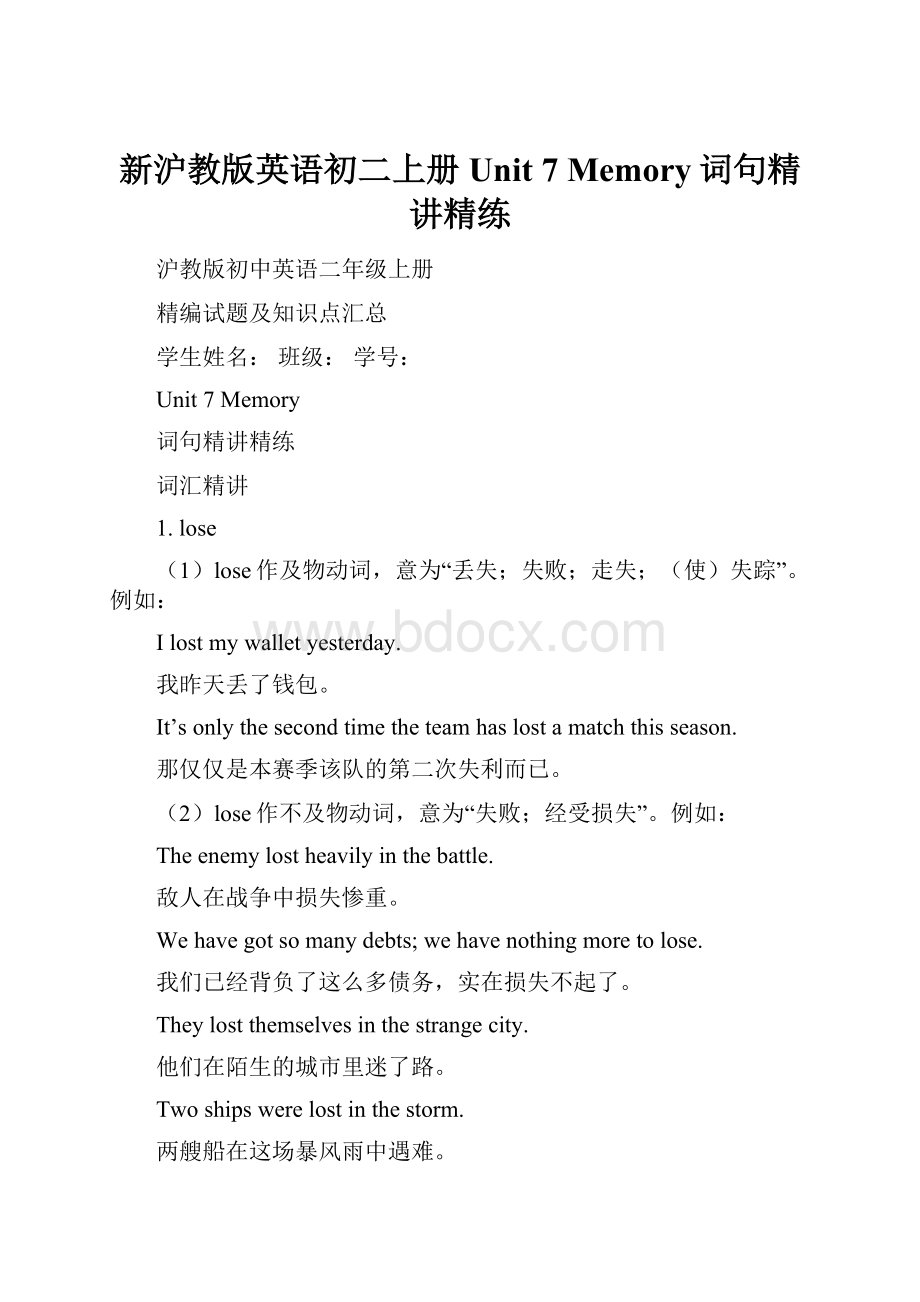 新沪教版英语初二上册Unit 7 Memory词句精讲精练.docx
新沪教版英语初二上册Unit 7 Memory词句精讲精练.docx
- 文档编号:29301010
- 上传时间:2023-07-22
- 格式:DOCX
- 页数:17
- 大小:24.68KB
新沪教版英语初二上册Unit 7 Memory词句精讲精练.docx
《新沪教版英语初二上册Unit 7 Memory词句精讲精练.docx》由会员分享,可在线阅读,更多相关《新沪教版英语初二上册Unit 7 Memory词句精讲精练.docx(17页珍藏版)》请在冰豆网上搜索。

新沪教版英语初二上册Unit7Memory词句精讲精练
沪教版初中英语二年级上册
精编试题及知识点汇总
学生姓名:
班级:
学号:
Unit7Memory
词句精讲精练
词汇精讲
1.lose
(1)lose作及物动词,意为“丢失;失败;走失;(使)失踪”。
例如:
Ilostmywalletyesterday.
我昨天丢了钱包。
It’sonlythesecondtimetheteamhaslostamatchthisseason.
那仅仅是本赛季该队的第二次失利而已。
(2)lose作不及物动词,意为“失败;经受损失”。
例如:
Theenemylostheavilyinthebattle.
敌人在战争中损失惨重。
Wehavegotsomanydebts;wehavenothingmoretolose.
我们已经背负了这么多债务,实在损失不起了。
Theylostthemselvesinthestrangecity.
他们在陌生的城市里迷了路。
Twoshipswerelostinthestorm.
两艘船在这场暴风雨中遇难。
【拓展】
lose的过去式及过去分词一样,为lost。
loser为其名词形式,意为“失败者”。
2.improve
(1)improve作及物动词,意为“改善;改进;提高”。
例如:
Yourworkwillgetby,buttrytoimproveit.
你的工作勉强通过了,但要设法改善它。
Heofferedasuggestiontoimprovetheplan.
他提出一个建议,以改进那项计划。
IwanttoimprovemyEnglish.
我想提高我的英语水平。
(2)improve作不及物动词,意为“变得更好”。
例如:
Wineimproveswithage.
酒存放得越久越醇。
IhopetheweatherwillimprovebeforeFriday.
我希望星期五之前天气会好转。
3.mind
mind作及物动词,意为“介意、照料、留神、注意”。
常用于疑问句、否定句、条件句中,后面接名词、代词、动词-ing形式或从句。
例如:
Wouldyoumindopeningthewindow?
你介意打开窗户吗?
Don’tmindme.不要管我。
【拓展】
mind还可作名词,意为“智力、头脑、想法、意见”。
例如:
Hehasquickmind.他头脑敏锐。
Tomchangedhismindatlast.最后Tom改变了主意。
4.worth
(1)worth作名词,意为“价值”。
例如:
Thethievesstole1millionpounds'worthofjewellery.
窃贼偷走了价值100万英磅的珠宝。
(2)worth作形容词,意为“值得的;值钱的”。
通常的句型为sth.beworthdoing…,意为“……值得……”。
动名词短语在这里表被动的意义。
例如:
Thehouseisworthalotofmoney.
这栋房子值很多钱。
Themoviewasworthseeing.
那部电影很值得看。
5.similar
similar作形容词,意为“相似的”。
besimilarto…意为“与……相似,接近”,一般用在相近似的物品和情境的对比上。
例如:
Hisproblemissimilartoyours.他的问题和你的相似。
IguessitmaybesimilartotheHinduculture.我猜想,这可能接近于印度文化。
【拓展】
(1)looklike意为“看起来像……”。
应用范围最广,除了描述人、物之外,也能抽象表达事件或现象。
例如:
Helookslikeafamousmoviestar.他看起来像一个电影明星。
Itlookslikeit'sgoingtorainsoon.天看起来要下雨。
(2)takeafter最常见的是用在有血缘关系的亲子之间,外貌用的最多,也能够用在性格脾气这些内在特质上。
例如:
Shetookafterhermotheralmostineverything.她几乎与她母亲一模一样。
AdamwasmygrandfatherandItakeafterhim.亚当是我的祖父,我和他很相像。
6.wish与hope
(1)相同点:
表示“想;希望”,宾语可为todo,不能用doing。
例如:
Ihope/wishtovisitGuilin.我希望去桂林观光。
(2)不同点:
wish后可以跟复合宾语,即wishsb.todosth.,而hope不能。
例如:
Iwishyoutogo.(正)我希望你去。
Ihopeyoutogo.(误)我希望你去。
(3)两者都可接that从句,但是“hope+that从句”表示希望,“wish+that从句”表示愿望,且从句的谓语动词要用虚拟语气。
例如:
Ihopeyou’llbebettersoon.我希望你很快好起来。
IwishIwerereallywealthy.但愿我真的富有。
(4)wish后可接双宾语。
例如:
WewishyouahappyNewYear!
我们祝你新年快乐!
7.sound
sound作连系动词,意为“听起来”,后面跟名词或者形容词作表语,构成主系表结构。
例如:
Yourideasoundsgreat.你的想法听起来很不错。
sound当名词讲时,意为自然界的各种声音。
例如:
Soundtravelsslowerthanlight.声音传播比光慢。
【拓展】
常见的连系动词有:
be动词(am,is,are);和感官有关的词(look看起来,feel摸起来,taste吃起来,smell闻起来);表示改变,变化含义的词(get,become,turn,go,come);以及其他常用词seem等。
例如:
Hisfaceturnsred.Doyouknowwhy?
他的脸变红了。
你知道为什么吗?
Thefoodwentbad.食物坏了。
8.die
die作动词,意为“死”,其过去式为died,现在分词形式为dying。
例如:
Mygrandfatherdiedattheageof86.
我爷爷在86岁时去世了。
Flowerswillsoondieiftheyareleftwithoutwater.
如果不给花儿浇水,很快它们就会枯死。
【拓展】
die,dead,death,dying都与“死”相关,区别如下:
(1)die是动词,强调动作。
例如:
Dad,howdidmydogdie?
爸爸,我的狗是怎么死的?
(2)dead是形容词,bedead强调状态。
例如:
Mydogisdead我的小狗死了。
(3)death是名词,可做主语或宾语。
例如:
Caraccidentscausedmanydeaths.
车祸造成很多人死亡。
(4)dying作形容词,意为“快要死的,垂死的,临终的”。
例如:
Thelittlegirlcriedwhenshesawherdyingcat.
看到快死的小猫,小女孩哭了。
9.finish
finish意为“完成,结束”,作及物动词时,其后可跟名词、代词或动名词。
即:
finishsth.或finishdoingsth.。
例如:
Ifinishedmyhomeworkthismorning.我今天上午做完了作业。
Whendidyoufinishdrawingthepicture?
你什么时候画完那幅画的?
【拓展】
能接V-ing作宾语的动词还有:
practice,enjoy,mind,keep等。
例如:
practicedoingsth.练习做某事
enjoydoingsth.喜欢做某事
minddoingsth.介意做某事
keepdoingsth.一直做某事
10.surprised
surprised是形容词,意为“吃惊的,感到惊讶的”,句子的主语通常是人。
例如:
I’msurprisedattheaccident.
我对这起事故感到很吃惊。
Howsurprisedthestudentsare!
学生们是多么吃惊啊!
【拓展】
(1)surprising也是形容词,意为“吃惊的,令人惊讶的”,常修饰物。
例如:
Hetoldmesomethingsurprising.
他告诉我一些令人吃惊的事情。
(2)surprise作动词时,意为“使……惊奇,使……感到意外、吃惊”。
例如:
Whatsurprisedyou?
什么事使你感到意外?
(3)surprise作名词时,意为“吃惊,惊讶”。
这种吃惊可能包含着“高兴、害怕或忧虑”。
1)作不可数名词时,表示“惊奇,惊异”。
例如:
Herfaceshowedsurpriseatthenews.听到这个消息,她的脸上露出了惊奇的表情。
2)作可数名词时,表示“惊奇、惊讶、意外的事或吃惊的事”。
例如:
Hegavemeasurprisebyarrivingearly.他的早到使我大感意外。
3)作名词用时还可构成短语:
toone’ssurprise意为“使某人吃惊的是……”。
insurprise吃惊地
例如:
Tomysurprise,hepassedtheexam.使我吃惊是,他竟然通过了考试。
Helookedatmeinsurprise.他吃惊地望着我。
词汇精练
I.把下列词组英汉互译。
1.howtodo________________________________________
2.或者……或者……____________________________________________
3.forexample_______________________________________
4.havetroubledoingsth.__________________________
5.砍倒______________________________________
6.thelistofsteps_________________________________
7.水循环____________________________________________
8.一个……另一个……____________________________________________
9.不得不____________________________________________
10.inthefuture____________________________________________
II.根据汉语或首字母提示补全句子。
1.Il_______myruleryesterday.Iamalwayslookingforit.
2.Itmademe_______(想起)myownvisittoBeijing.
3.Readingalotcani_______yourEnglish.
4.HanLiangdoesn’tdowellinEnglish.His_______(拼写)isbad.
5.Thebookisworth_______(读).
6.Mr.Forgothasabad_______(记忆).
7.Thereisachairinthe_______(角落)oftheroom.
8.Mrs.Blackhasgoodandproper_______(方法)togettheirchildrentodohousework.
9.Mymumoftengoesshoppingwithashoppingl_______.
10.Thetwowordssoundss_______.
III.用括号中所给单词适当形式填空(每空不限一词)。
1.Runningstarsshouldeatlotsof_______(health)food.
2.Thepeopleonvacationarereally_______(relax).
3.Wehadgreatfun_______(play)inthewaterlastMonday.
4.Don’tmakesomuch________(noisy).Mylittlebrotherissleeping.
5.Wecanpractice_______(speak)EnglishwithothersattheEnglishcorner.
IV.听力链接。
(2015年安徽省中考)
短文理解
你将听到一篇短文,短文后有五个小题。
请根据短文内容,在每小题所给的A、B、C三个选项中选出一个最佳选项。
短文读两遍。
21.WhatdoesJimoftengetfromhisparents?
A.Usedbooks.B.SomedrinksC.Pocketmoney
22.WhydoesJimtryhisbesttosavemoney?
A.Becausehethinksit’snoteasytomakemoney.
B.Becausehethinkshisfamilyisnotveryrich.
C.Becausehewantstobuysomenewbooks.
23.WheredoesJimoftenbuybooks?
A.Inthebookstores.B.Inthesupermarkets.C.OntheInternet.
24.HowdoesJimgotoschoolwhenitrains?
A.Onfoot.B.Bybus.C.Bybike.
25.WhatdoesthespeakerthinkofJim?
A.Poor.B.Good.C.Silly.
【参考答案】
I.把下列词组英汉互译。
1.如何做2.either…or…3.例如4.做某事有困难5.cutdown
6.步骤的清单7.watercycle8.one…theother…9.haveto10.在将来
II.根据汉语或首字母提示完成下列句子。
1.lost2.remember3.improve4.spelling5.reading
6.memory7.corner8.methods/ways9.list10.similar
III.用括号中所给单词适当形式填空(每空不限一词)。
1.healthy2.relaxed3.playing4.noise5.sleeping
IV.听力链接。
21.C22.A23.C24.A25.B
听力原文:
短文理解
你将听到一篇短文,短文后有五个小题。
请根据短文内容,在每小题所给的A、B、C三个选项中选出一个最佳选项。
短文读两遍。
Jim’sparentsworkveryhardandhisfamilyhasbecomeveryrich.Astheonlychildinhisfamily,heoftengetssomepocketmoneyfromhisparents,buthetrieshisbesttosavemoneybecausehethinksit’snoteasyforhisparentstomakemoney.
Jimlikesreading.HeoftenbuyssomeusedbooksontheInternetbecausethey’recheaper.Andwhenhehasfreetime,heoftengoestolibrariestodosomereading.
Jimusuallygoestoschoolbybike.Whenitrains,hewalks.Andthisalsohelpstokeephimhealthy.
Jimalwaysbringsabottleofwatertoschool.Whenotherstudentsdrinkjuice,heenjoyshiswater.Hethinkswateristhecheapestbutbestdrink.
SomestudentsthinkJimispoor.ButIthinkheisagoodboy.Whatdoyouthinkofhim?
句式精讲
1.Becausetheyenjoylearningaboutmemory.
enjoydoingsth.意为“喜欢做……”或者“做……很开心/很享受”。
其中的enjoy是动词,有“欣赏,享受,喜爱”等意思,后接名词、代词或动名词。
例如:
Peopleenjoythecity’squietstreet.人民喜爱这个城市宁静的街道。
Ienjoylisteningtopopmusic.我喜欢听流行音乐。
【拓展】
enjoy常见的习惯用语还有enjoyoneself“玩得开心,过得愉快”,和haveagoodtime同义。
例如:
Theyareenjoyingthemselves.=Theyarehavingagoodtime.他们玩的很开心。
2.Becausetheywanttohelpstudentsimprovetheirmemory.
want作动词,意为“想要,需要”,其后可接名词、动词不定式等。
常用于以下结构:
(1)wantsb.todosth.想要某人做某事
例如:
Hewantsmetoplaywithhim.他想让我和他一起玩。
Hewantsmetohelphim.他想要我帮他。
(2)wanttodosth.想要做某事
例如:
Iwanttohavearest.我想要休息一下。
Theywanttogohome.他们想要回家。
(3)wantsth.想要某物
例如:
Shewantsapen.她想要一支钢笔。
Shewantsacupoftea.她想要一杯茶。
【拓展】
want后接动词不定式时,相当于wouldlike。
want(sb.)todosth.=wouldlike(sb.)todosth.
3.…ifyourememberhowtospelltheword…
句中howtospelltheword为“疑问词+不定式”,在句中作宾语。
不定式可以和疑问词what,how,when,where等连用,共同作句子的宾语或表语等,但此时不定式一定要放在疑问词的后面。
例如:
Canyoushowmehowtoturnoffthecomputer?
你能让我看看如何关电脑吗?
(howtodosth.作宾语)
Wheretospendtheweekendhasn’tbeendecidedyet.
去哪里度过周末还没有被决定出来呢。
(wheretodosth.作主语)
【拓展】
有些动词或动词词组,如decide,know,show,tell,forget,remember,learn,findout等可以用“疑问词加不定式”结构作宾语。
例如:
Pleaseshowushowtodothat.
请演示给我们如何去做。
Theyhaven’tdecidedwhethertoaccepttheinvitation.
他们还没有决定是否接受邀请。
4.Forexample,youmayhavetroublerememberingthelist….
havetrouble(in)doingsth.意为“做某事有麻烦”。
例如:
Hehastrouble(in)learningEnglish.他学英语很吃力。
【拓展】
此类动名词前省略介词in的常用结构有:
haveadifficulty(in)doingsth.做某事有困难
havetrouble(in)doingsth.做某事有麻烦
haveaproblem(in)doingsth.做某事有问题
haveagoodtime(in)doingsth.做某事很开心
havefun(in)doingsth.做某事很开心
spendsometime(in)doingsth.花时间做某事
haveadifficulttimedoingsth.做某事很难/很费力
haveahardtime(in)doingsth.做某事很难/很费力
5.Unlessyougetenoughsleepeverynight,youwillnotrememberthingswell.
连词unless意为“除非……,如果不……”,多引导一个否定意义的真实条件句,有时也可引导非真实条件句。
unless引导条件句时,主要用于下列情况:
(1)主句为肯定句。
例如:
Youwillmissthebusunlessyouhurryup.
你要不快点就会错过班车。
You’llfailinchemistryagainunlessyouworkharder.
如果你不再加把劲,你化学考试还会不及格。
(2)主句为否定句。
例如:
UnlessIvisiteverybookstorein
- 配套讲稿:
如PPT文件的首页显示word图标,表示该PPT已包含配套word讲稿。双击word图标可打开word文档。
- 特殊限制:
部分文档作品中含有的国旗、国徽等图片,仅作为作品整体效果示例展示,禁止商用。设计者仅对作品中独创性部分享有著作权。
- 关 键 词:
- 新沪教版英语初二上册Unit Memory词句精讲精练 新沪教版 英语 初二 上册 Unit Memory 词句 精练
 冰豆网所有资源均是用户自行上传分享,仅供网友学习交流,未经上传用户书面授权,请勿作他用。
冰豆网所有资源均是用户自行上传分享,仅供网友学习交流,未经上传用户书面授权,请勿作他用。


 #2机组现场施工用电布置措施.docx
#2机组现场施工用电布置措施.docx
